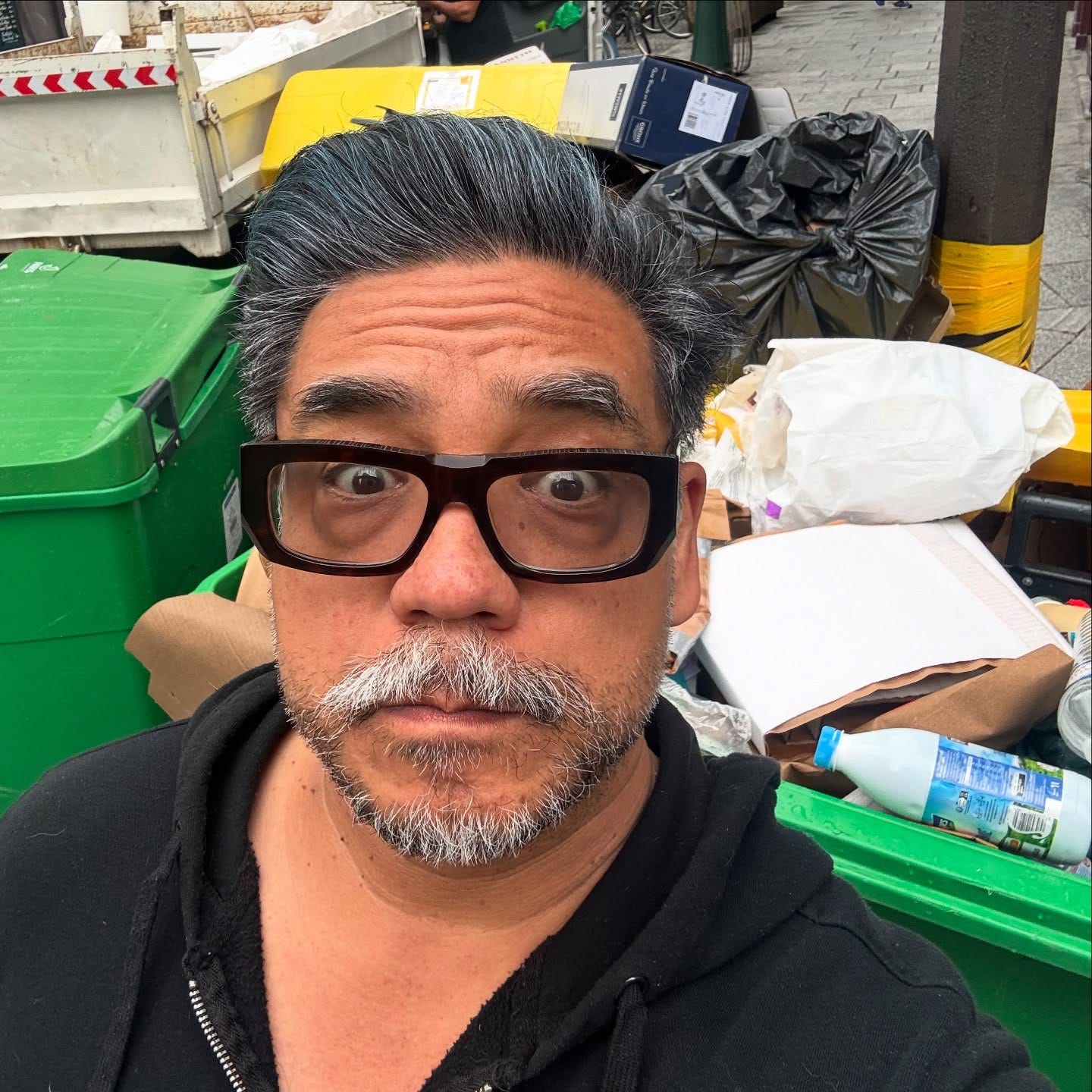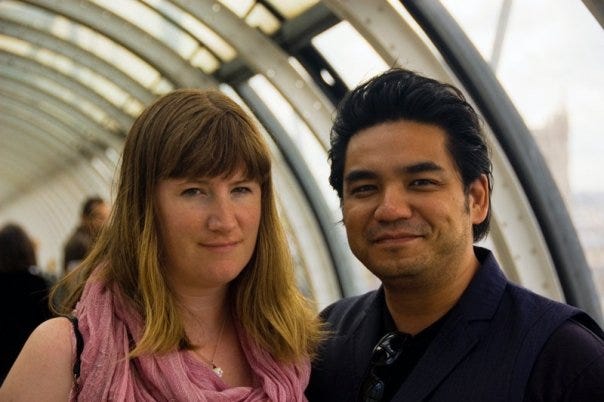What drives Americans to leave home and settle elsewhere? That question has been on my mind for many years. This series, Leaving America, seeks to uncover the multitude of reasons and lessons learned—beginning with Americans in Paris. Become a paid subscriber to access this newsletter’s archives!
One of the Americans I met early on in my reporting days and, perhaps more importantly, the beginning of coffee shop culture in Paris, was Omid Tavallai. As Emperor Norton, he and his wife, Alannah, had begun supplying the best cafés and events with cookies, cakes, buns, and slew of other treats. Shortly thereafter, Omid became a regular in the kitchen at the bar Red House, known to this day for his tacos. But food didn’t bring him to Paris, a corporate job did. I’ve always appreciated his candor (and his musical tastes— NIN!) and I knew his immigration story would add to the discussions in this series.
Where was the last place you lived in the U.S.?
San Francisco, CA.
Did you intend to leave permanently or was the move temporary?
The Paris-based company I was working for in California offered me a promotion to a job in France. I was told, “This is not a temporary deal; it’s a one-way ticket,” so I knew it was, at the very least, a long-term commitment, which has more or less cemented itself as permanent over the years.
Was there a pivotal moment when you knew your life would be best pursued elsewhere?
I grew up a bit on the move, having been born in Iran, living my early childhood in the UK, and growing up in the United States. So, as an immigrant twice over already, I don’t think there was ever any sharp, pivotal moment where I’d decided, “It’s time to go!” If anything, it’s when I won a radio station contest to travel to the Glastonbury Festival in England that I first traveled outside of the U.S. in over twenty years, which triggered a sudden and intense love for international travel, which in turn had me considering the possibilities of a life outside of the U.S.
What sort of financial consideration did the move require, even if as a student initially? Does one need a plump savings account to make this work?
In my situation, I was fortunate enough to have a company to take care of my relocation and immigration. In retrospect, however (and talking to others who had worked for larger business entities than mine), the company had not done a very good job on those parts, so there were some hefty unexpected expenses. My wife, Alannah, and I had just gotten married before the move, so luckily, we had some wedding money. But I would advise anyone lucky enough to have the means to keep a few months’ worth of pay in the bank.
At what age did you leave? Looking back, was that too soon or too late?
I was 33, which I think was perhaps a bit too soon, but certainly not too late. It wasn’t until I started poking around for a new job that I realized just how enormous the gulf between French and American salaries can be. Had I been aware of it, I would’ve told myself to put the move on hold, rack up some of that sweet American-peak-capitalist money while I was still young and without a family needing education and healthcare, and then make the transition into a phase of life wherein the social safety net will be more important. Long story short: Be free and make bank while you’re young, find a stable home for later in life. This is so grossly opportunistic in an American-peak-capitalist kind of way, but a lot of my French friends in the U.S. have done just that: Make money in the U.S. after university and come back to France to start a family.
“…you eventually ‘find your tribe’ and the whirlwind of frustrations and annoyances calms down, you take everything in stride, and face all the challenges (because they don’t stop!) with more, well, Gallic nonchalance.” — Omid Tavallai
When did you know you'd made the right [or wrong] call?
I thought I had made the wrong call a few months after starting my job in France. I was in my office, working alone and late because no one else would, and suddenly I got short of breath, thinking I was having a heart attack. I didn’t realize until I called my wife in a panic that I was having my first-ever anxiety attack. I had just made an international move, and the people who brought me here left me feeling completely unsupported after the first month. The transition takes far more time than you could ever imagine, and it takes a toll. To be honest, it took a few years for me to know I’d made the right call. As I often tell people, it’s hard, especially in Paris, to fit in. Things can feel very insular, socially or in business. But then you eventually “find your tribe,” and the whirlwind of frustrations and annoyances calms down, you take everything in stride, and face all the challenges (because they don’t stop!) with more, well, Gallic nonchalance.
What does Paris offer you that your native home couldn’t and, perhaps, still can’t?
Not having to live in a roommate situation as a grown-ass man, for starters! And while I severely miss being able to hop in a car and go to the ocean or mountains at any time, the whole of Europe is a train ride away. In short: TRAINS.
Can you share any anecdotes about your highest and lowest moments in Paris?
Watching good friends compete in a global bartending contest atop the Eiffel Tower was literally the highest moment. I’d made some food for the pairing, so I can claim my food was served at the Eiffel freakin’ Tower, but the high really came from watching people in my aforementioned “tribe” bring some serious game. The lowest moments all come from dealing with the infamous “administration française”. I’ve never had to beg or grovel more in my life, just to get paperwork done.
Are there aspects of American life that you long for?
Efficiency. Maybe it’s the product of overcapitalism, but you can get pretty much anything done in America if you have the will or the means, from shopping to social mobility. On a less abstract level: Space. A luxury restaurant here isn’t about fancy ingredients but about not having someone’s elbow in your back while you’re trying to eat.
What book or movie do you most associate with the American experience abroad?
I should say something like Down and Out in Paris and London, but Orwell was British, wasn’t he? Also, I never actually finished the book. So, umm, that one Anthony Bourdain documentary, Roadrunner. While there’s a lot of food, and wonder, and romance, ultimately it’s about heartbreak and pain, and how even going to the coolest places in the world won’t fix what’s broken at home.
If you had to narrow it down to one, what is the greatest lesson living abroad has taught you about yourself and the world?
This may sound off-character, as I paint myself as a bit of an introvert and misanthrope, but it has to be that people are amazing. Since transitioning into the hospitality industry, I’ve been out in public more than I ever wanted. I meet Parisians, French people, immigrants, and visitors from all over the world. And so many of them have stories. Some have even become friends. I’ve learned to put myself out there more.
Have you ever considered going back? (Why or why not)
The temptation is there. Alannah and I both have aging parents, and alongside taking care of our child, we want to make sure our folks are well taken care of. But the political situation and lack of a safety net make it a grim proposition. So maybe we’ll have to find a way to bring them over here. (Bonjour, l’administration française. Here I am, begging again!)
For those contemplating leaving the U.S., what do you suggest they consider most about the decision?
Prepare for change. If you leave the U.S. long-term, understand that there will be a lot of change beyond the obvious: language, money, and lifestyle. For instance, Paris has changed a lot since I got here. Your new home is not a perfect postcard moment frozen in time, and you will be part of that change. By the same token, your old home will change, too. With every visit back, you’ll notice the changes, but eventually you don’t recognize it anymore. You, too, will change. I’m not the same person I was when I landed here seventeen years ago, and I’m grateful for it.
Related reading: Americans on the sorrow— and relief— of leaving Trump’s U.S. for Europe. (The Guardian)
Click here to read all previous Leaving America questionnaires. If you think a friend would enjoy The New Paris Dispatch, gift subscriptions are available here.




Another incredible interview. I nodded along to everything said.